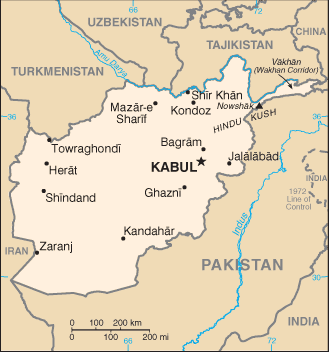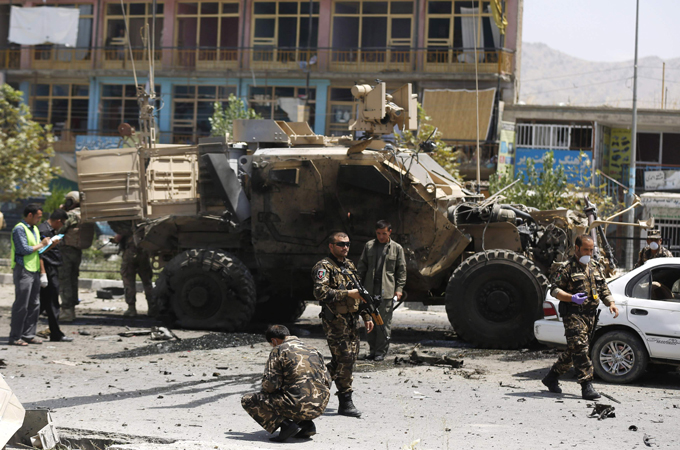http://news.antiwar.com/2014/08/12/afghanistans-ghani-no-power-sharing-if-i-win-recount/
 Ashraf Ghani, who won the first count and was the one many election officials were stuffing boxes on behalf of, has faced growing criticism from his supporters for agreeing to the US plan, and no says he has no intention of sharing power if he wins.
Ashraf Ghani, who won the first count and was the one many election officials were stuffing boxes on behalf of, has faced growing criticism from his supporters for agreeing to the US plan, and no says he has no intention of sharing power if he wins.
Afghanistan’s Ghani: No Power-Sharing If I Win Recount
US Election Deal in Serious Doubt as Ghani Rejects Key Pledge
by Jason Ditz, August 12, 2014
Analysts have been noting how little point there was to the latest Afghan Presidential election, as after evidence of massive fraud and ballot stuffing, the US negotiated a deal for both candidates to share power.
 Ashraf Ghani, who won the first count and was the one many election officials were stuffing boxes on behalf of, has faced growing criticism from his supporters for agreeing to the US plan, and no says he has no intention of sharing power if he wins.
Ashraf Ghani, who won the first count and was the one many election officials were stuffing boxes on behalf of, has faced growing criticism from his supporters for agreeing to the US plan, and no says he has no intention of sharing power if he wins.
“Dual authority is not possible,” Ghani insisted, saying Abdullah would only serve as “chief executive,” the consolation prize supposed to be created in the power-sharing deal, at his discretion and under his orders.
The audit is still continuing, 11 months into the election process, and shows no sign of ending any time soon. Ghani has spurned all recount efforts that might significantly undercut his margin in the preliminary count. Abdullah Abdullah, the front-runner going into the vote, has broad support in northern Afghanistan, and some supporters have threatened to try to take power by force on his behalf, which was why the US was so desperate to reach the deal. In the absence of power-sharing, the risk of a civil war within Afghanistan’s already massive war cannot be ruled out.
http://www.afr.com/p/world/ghani_rejects_vote_deal_1qHLDqaz2ocRh9LWNttFYO
Ghani rejects vote deal
PUBLISHED: 2 HOURS 26 MINUTES AGO | UPDATE: 2 HOURS 2 MINUTES AGO
PAMELA CONSTABLE
Ashraf Ghani, one of two candidates competing to become Afghanistan’s president, said the deadline to finish a vote recount is slipping and that a US-brokered agreement for the rivals to form a joint government afterward does not mean the winner will fully share power with the loser.
Speaking to foreign journalists at his fortified compound in Kabul on Tuesday, Mr Ghani appeared to be trying to tamp down a surge of discontent among his supporters and allies, many of whom are reportedly upset he agreed under US pressure to a full recount of ballots from the troubled presidential runoff in June and the formation of a unity government with his rival.
On Friday, Mr Ghani restated those pledges during a visit by US Secretary of State John Kerry. But on Tuesday, he sought to clarify that he has not agreed to a power-sharing agreement with former foreign minister Abdullah Abdullah. Mr Ghani said the winner will appoint the loser by decree as a chief executive to serve “at the discretion of the president”. Mr Abdullah has demanded more authority if he loses.
Mr Ghani also said that although he hoped the audit of 8.1 million votes could be done in time to have the new president attend a NATO summit in early September, no inauguration date has been set because of “technical uncertainties” with the ballot review.
He and Mr Abdullah will attend the summit, considered key to winning foreign aid for the Afghan economy.
Mr Ghani finished ahead in the runoff but accepted the recount after Mr Abdullah, who came in first in an initial round of voting in April, claimed massive fraud. Mr Ghani was careful Tuesday not to claim victory.
http://www.aljazeera.com/news/southasia/2014/08/suicide-bomber-targets-nato-convoy-kabul-201481083243444310.html
Suicide bomber targets NATO convoy in Kabul |
Taliban claims responsibility for bombing that killed four civilians and injured dozens in Afghanistan's capital.
Last updated: 10 Aug 2014 11:41
|

The Taliban claimed responsibility for the attack in Kabul [Reuters]
|
At least four civilians have been killed in a suicide bombing targeting a NATO convoy in the Afghan capital Kabul, officials said.
The Taliban claimed responsibility for Sunday's attack, in which the bomber detonated an explosives-packed vehicle on a main road as the NATO convoy passed by. A large crater was created.
Al Jazeera's Jennifer Glasse, reporting from Kabul, said there were no NATO casualties in the bombing, as the military personnel were travelling in heavily armoured vehicles.
Thirty-five civilians were injured, according to the chief of police.
"Even though the target was military, as so often is the case here, civilians bore the brunt," our correspondent said, referring to UN figures showing that civilian deaths and injuries in the first six months of 2014 were 24 percent higher than over the same period last year.
NATO's International Security Assistance Force (ISAF) said in a statement: "We can confirm that an ISAF convoy was attacked by enemy forces in Kabul today.
"There are no reports of ISAF fatalities at this time. We sincerely regret the loss of the lives and injury to innocent Afghan civilians caused by the insurgents in this tragic incident."
The Taliban has pledged to step up attacks against Afghan security forces in a bid to undermine the Western-backed government as foreign combat troops prepare to withdraw by the end of the year.
US-led foreign troop numbers in Afghanistan have declined from a peak of 150,000 in 2012 to just 44,300 now.
Editorial: Election crisis, peace talks and policy shift
Unfortunately in recent times this country two pressing challenges—insecurity and election crisis had held this country by its throat. The one is giving way likely as soon the election crisis will be over, however the second one is of persistent and dogging nature. Now that we know that insurgency has been surging in different parts particularly those near to Pakistan, in the face of election crisis therefore there is need for a new approach to end this insurgency. Until this day, Afghan President Hamid Karzai has taken a tough road against America while tirelessly calling Pakistan a brother, but this policy has drawn mix responses at home. At times his serious defiance in front of America put his life in dangers. He didn’t do it for his personal gains rather for national interests. The two issues—the transfer of Bagram prison and aerial bombings by foreign troops have had kept him on a bad note with the United States, but he never bowed down. However, in case of Pakistan, he has always preferred to diplomacy over sternness and adopting an angry posture. Keeping a balance in relations with the two countries—India and Pakistan has always been a challenging job, but Karzai played it well by calling Pakistan a brother and India a friend. Albeit instead of calling and treating Afghanistan like a brother, Pakistan has stabbed it. Now that the electoral crisis has been catching length and insurgency raging up, the country needs unity and serious defense against foreign interference. Unity could be fostered only when the second phase of the presidential poll is made successful and by coming a new president on the political pulpit with under a transparent process. The new president shouldn’t be a man of a straw as currently the country needs a leadership with determination and stronger brain. The current procedure being adopted to negotiate with the insurgent Taliban has not been working well. Instead of coming to the table of talks they have always relied on time-buying tactics. They have upped their insurgent attacks in Helmand and Nangarhar’s Hesarak. Coping with the new wave of insurgency will test the mettle of the new president. But the biggest concern is whether there will be a new president at all when one of the presidential candidates has once again defied vote audit criteria. First this concern needs to be overcome and after that we as a nation could be in the position to fight back militancy and foreign interferences. Recent media reports say that in Helmand the biggest ever Taliban attack was led by Punjabi Taliban. In Hesarak the presence of thousands of Pakistani Taliban is something we cannot turn our eyes away from. They brazenly have challenged the government writ there and made the lives of the civilians in Hesarak miserable. In such a time the nation looks stand divided because of the political immaturity of our elite. The current effort to negotiate with insurgents will never work until the coming government wear a seriously angry posture against Taliban and chase them with a hot pursuit. Moreover, whether the United States will change its Afghan policy or not is also a question of no less importance. Until now the US dominates the process while President Hamid Karzai complained about it repeatedly. To repel Taliban’s growing insurgency, to overcome foreign interferences, and to see this nation of multi-ethnic groups in one united line, the coming government and the United States will have to bring changes in their policies. Until this happens we cannot hope for peace and development.
|





No comments:
Post a Comment